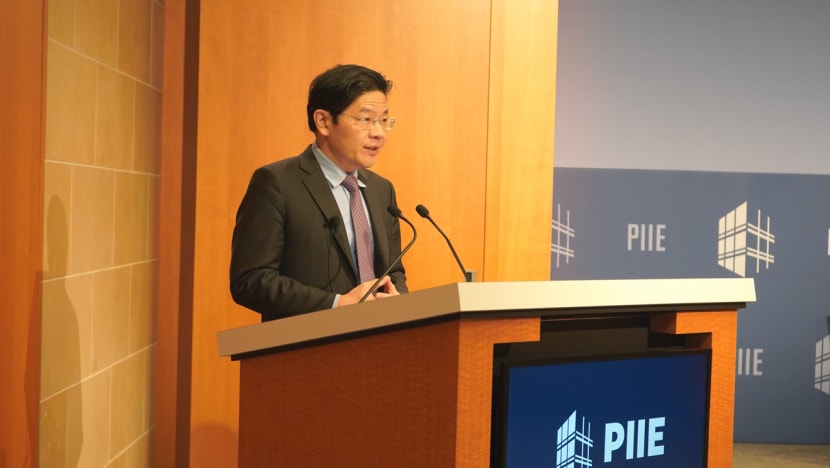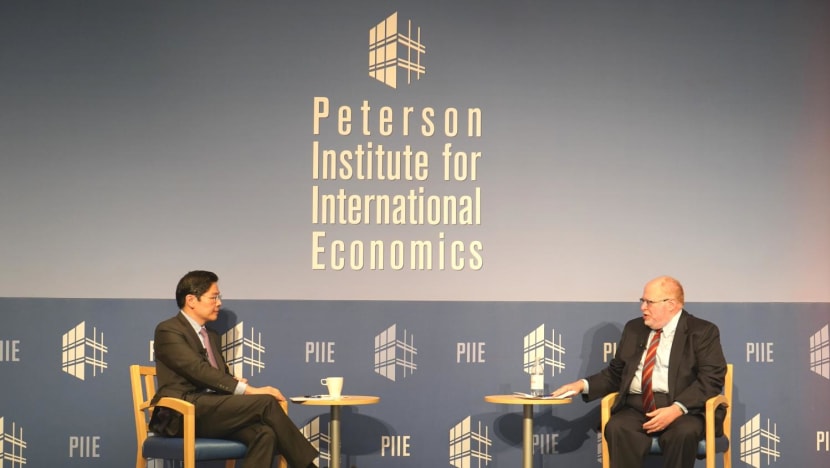World faces sharper trade-off between growth and inflation: Lawrence Wong

Minister for Finance Lawrence Wong at the Peterson Institute for International Economics Macro Week 2022 on Monday, Apr 18, 2022. (Photo: Ministry of Finance)
SINGAPORE: The world faces a sharper trade-off between growth and inflation given how it is “almost a certainty” that inflation will be higher for longer, said Finance Minister Lawrence Wong on Monday (Apr 18).
Many countries around the world were already grappling with the issue of lacklustre growth before the COVID-19 pandemic. But the virus outbreak and the war in Ukraine have since brought on another challenge of higher inflation.
Global growth is also threatened by the effect of domestic macroeconomic policies in some major economies.
“In short, the risks for both growth and inflation are weighed significantly on the downside,” Mr Wong said, noting that this complicates an already extremely difficult task of balancing growth and inflation for central banks, particularly those in the advanced world.
It remains to be seen whether central banks can successfully guide their economies to a soft landing, he added.
Compounding these growth challenges is a “more fundamental and worrying shift” in the global economy – the ebbing tide of globalisation. While he does not expect a reversal of globalisation, Mr Wong cautioned that the world “could be heading into a new era of decoupled globalisation”.
“The hope for some decades has been that trade could tamp down geopolitical rivalry but we are now seeing another logic at play, with geopolitics having the potential to undermine trade instead,” he said.
“It is too early to tell what decoupled globalisation will look like, but we must be prepared for a more divided world economically that will mirror a more divided world politically.”
This will have an impact on global growth, with the poorest and most vulnerable countries likely being hit the hardest. This will in turn make it more difficult for developing countries to converge with the advanced world, he said.
Mr Wong was laying out the threats that governments and societies today face when it comes to growth in a keynote speech delivered at the Peterson Institute for International Economics’ (PIIE) Macro Week in Washington DC. The annual event features a series of speeches and discussions by finance ministers and central bankers from around the world.
In his near 30-minute speech, the Finance Minister, who is on a visit to the United States, also highlighted two other structural challenges faced by the world – inclusion and sustainability.
On the former, Mr Wong noted that there is a growing divide between the richest and poorest both across and within nations, partly due to rapid technological advances.
Inclusive growth has also been made more difficult by the pandemic, with unskilled workers and women having suffered disproportionately. He also pointed out how in Southeast Asia alone, the pandemic has pushed nearly five million more people into extreme poverty.
“The consequence of these factors – weak and uneven income growth, high inequality, and weak social mobility – pose significant risks for us all,” said Mr Wong.
"When people feel that the odds are stacked against them, when they cannot reach the top no matter how hard they try, when their children will never do better than them, social stability is affected and things start to fall apart."
On sustainability, the need for meaningful action on climate change has grown as global warming continues apace, he said.
But with so much attention being focused on the war in Ukraine and the COVID-19 pandemic, the latest “sobering” report issued by the United Nations’ Intergovernmental Panel on Climate Change (IPCC) on the increasing severity of climate change did not attract headlines the way it should have, said Mr Wong.
Given the Ukraine conflict, reliance on fossil fuels is expected to increase even further in the short term.
“This may be necessary to cope with the short-term energy shortages and to keep the lights on, but it also means that we must redouble our efforts in the medium and longer-term, to set the right price for carbon, regulate emissions and invest in cleaner, low-carbon technologies,” he added.
“NO EASY ANSWERS”
There are “no easy answers” when it comes to responding to these challenges, Mr Wong said.
He noted that while expansionary monetary policy has succeeded in buffering economies and financial systems against severe shocks for more than a decade, it has had its downsides and has likely reached its limits.
“As the balance of macro-risks shift towards inflation, the era of easy money will come to an end. Fiscal policy therefore has to play a more important role,” he said.
Part of this is about being able to respond quickly with immediate stimulus when needed, Mr Wong added, noting that many countries have done so over the past two years to stave off the most severe downsides of COVID-19 and mitigate longer-term economic scarring.
But such extraordinary levels of spending will be hard to sustain over extended durations. With interest rates rising, there will be a need to taper spending or raise revenues to ensure more sustainable government budgets over time and to gradually rebuild fiscal space to deal with future shocks.
More crucially, Mr Wong noted that the issue “is not just about the amount of spending, but how and what we spend on”.
“We need to re-purpose fiscal policy and renew the social contract,” he said.
“This is not a call for bigger government per se. Rather it’s about the state playing a more active and purposeful role to achieve important longer-term goals – to raise productivity, to tackle inequality and rekindle social mobility, and to catalyse the green economy.”
With that, Mr Wong gave three suggestions on how the world can drive inclusive and sustainable growth.
The first is to re-purpose fiscal policy and the role of the state towards building public goods and longer-term collective capacity. These include spending to rejuvenate and expand critical infrastructure, investing in early child development, as well as healthcare.
Such investments by the state and designing the right incentives, whether in eldercare, healthcare, early childhood development or infrastructure, are the bedrock for building inclusive and sustainable growth, said the Finance Minister.
Mr Wong’s second suggestion is to foster a “refreshed common agenda” between the public and private sectors, given that it will not be possible for governments to fund investments or to resolve many of today’s complex challenges alone.
This will involve going beyond traditional models of public-private partnerships for specific projects so as to forge “wider, deeper and longer-term collaboration between the government and industry, and work towards shared goals that advance the broader interests of society”.
One such area that requires stronger public-private partnerships is continuing education and lifelong learning. Mr Wong said that this is a key priority in Singapore and steps taken include the Government setting up individual SkillsFuture learning accounts for all, with periodic top-ups by the Government.
On the other hand, authorities have been working with employers and training institutes to design training programmes that are relevant to the industry.
Mr Wong’s third suggestion is to reinvigorate the open and rules-based international order, with stronger commitments to multilateral solutions.
“Today, the world seems more divided than ever before. The future has never seemed more uncertain. But amidst our differences, we must find enough common ground with each other to solve our collective problems,” he said.

Later, in a question-and-answer segment moderated by PIIE president Adam Posen, Mr Wong was asked about the sanctions imposed on Russia by various countries, including Singapore, and what that means moving forward.
In his reply, the minister said the “unprecedented nature of the scale and strength” of the sanctions in this instance showed an “effective response” to the Russian invasion.
“But we do ask ourselves and all of us have to ask ourselves, how should we think about applying similar sanctions in the future?”
From Singapore’s point of view, applying such extensive sanctions will require a “high threshold”, ideally a United Nations Security Council resolution. But this is “not always forthcoming”, said Mr Wong.
In this instance, Russia, which is a permanent member of the UN Security Council, vetoed the council’s draft resolution in February.
“If you’re not able to get the United Nations resolution, then at least consider the criteria and the basis in which such sanctions should be applied,” Mr Wong said, citing “important” considerations for Singapore such as clear violations of the United Nations Charter and when the fundamental principles of territorial integrity, sovereignty and independence are at stake.
“These are fundamental principles and therefore, you could consider making a case for applying such sanctions,” he added.
“After all, if crazy decisions and historical errors are the basis for invading another country, all of us everywhere in the world will feel very insecure. So I think if we set the right conditions, we will have a stronger basis for applying sanctions in future,” Mr Wong said.
“In fact, you may even get more countries coming on board because countries everywhere would be able to support such core principles, rather than drawing lines between democracies versus autocracies or authoritarian states, or saying ‘Join me because we are a group of like-minded allies’.”
Mr Wong is on a 10-day visit to the US until Apr 25 – his first overseas trip since he was announced as leader of the fourth generation of Singapore’s political leadership.
Apart from his speech at PIIE's event, Mr Wong will be in Washington DC and New York to meet members of the US Administration. He will also attend the World Bank-IMF Spring Meetings as well as the Second Finance Ministers and Central Bank Governors Meeting under the 2022 G20 Indonesian Presidency.
Accompanied by officials from the Ministry of Finance and the Ministry of Home Affairs, Mr Wong will also take the opportunity to meet private sector business leaders and Singaporeans based in New York.

















